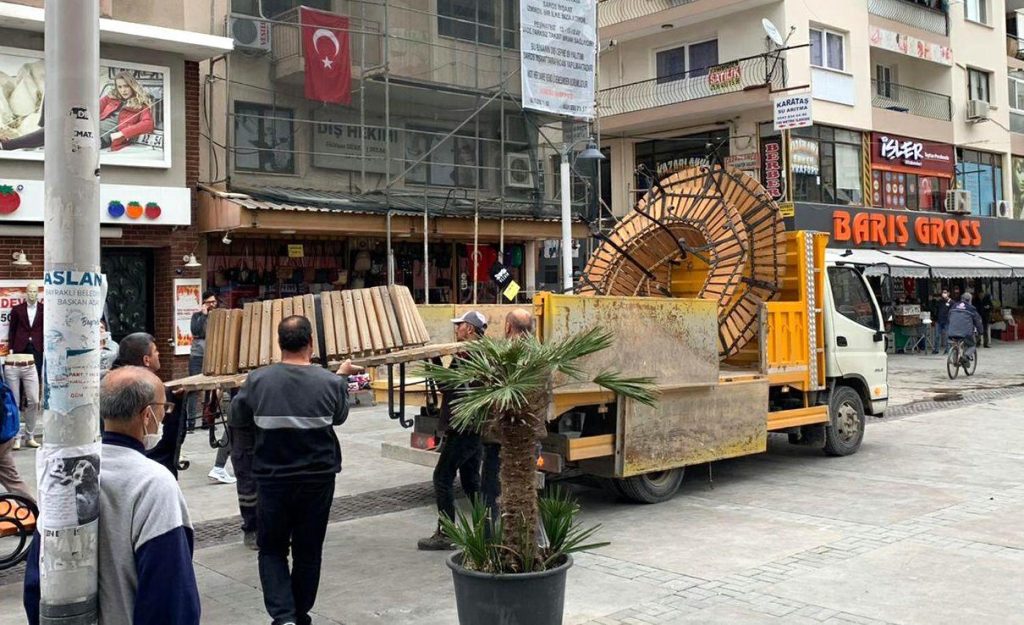Deaths, dismantling benches, and forced disinfection of the elderly – coronavirus in Turkey
59 people have died from coronavirus in Turkey as of March 26, and 2,433 are infected. There have been almost 600 new cases in the last 24 hours.
Midnight tweet from the Minister
Minister of Health Fahreddin Koji issued information on the epidemic in Turkey. A recent report states that they have tested about 30 thousand people suspected to have COVID-19.
The announcement of the most recent data has become a sort of “X-Hour” for the country. At approximately midnight local time, the Minister of Health publishes daily coronavirus statistics on his Twitter.
Each of his tweets immediately blows up on social networks. For example, Koji’s last tweet gained over 220 thousand likes and more than 35 thousand retweets in just a few hours.

The first time the government said anything about the coronavirus threat in Turkey was on March 12, when the Ministry of Health announced the first case of infection in the country.
Toilet paper shortage not an issue for Turkey
After this announcement, Turkey closed the borders with almost all neighboring countries as quickly as possible. All Turkish citizens arriving from abroad were quarantined.
The first cases of coronavirus were detected in Turks who came back from Saudi Arabia, where they were completing an ummah, or “small hajj” (the pilgrimage muslims take to Mecca).
As in almost all other countries, the coronavirus has become a source of panic in Turkey, which has caused people to start bulk buying. Supermarket shelves in all major cities were frantically emptied.
Due to different personal hygiene methods, nobody stocked up on toilet paper, unlike in Western countries.
In Turkey, as in the vast majority of eastern Muslim countries, people use bidets. Toilet paper can still be found in most bathrooms, except for in hotels.
But pasta and other non-perishable products flew off the shelves.
It reached a point where Minister of Internal Affairs Suleiman Soilu threatened major suppliers with criminal prosecution if they were unable to replenish products quickly enough.
Benches as a source of evil
One somewhat unorthodox measure that the authorities in Turkey decided to take was dismantling benches in parks and on the street. This way, they hope to reduce the amount of contact between people.

Most locals were sympathetic to this measure. Left without work, many people do all they can to avoid quarantining and often spend time on the street, talking with friends.
Depriving them of benches to sit on, many believe, discourages this behavior, which is far from ideal during an epidemic.
Forced disinfection of the elderly
Turkish authorities, in addition to closing the borders, settled on two main measures to counter the epidemic: closing several types of businesses, and categorically forbidding people over the age of 65 to leave their homes.
Violators are subject to a fine of 3,150 lire [about $480].
Immediately after this ban was announced, memes started popping up on social networks. Bloggers pointed out that Turkish President Erdogan is 66 years old.
But some took this ban as a call to actions and began to attack elderly people who, for whatever reason, were outside of their homes.
This happened to a mentally-ill old man, who was stopped in the street by young people, forced to wear a mask, and doused with cologne.
Utandıran görüntüler!
— Ensonhaber.com (@ensonhaber) March 24, 2020
Yaşlı adamı durdurup, yüzüne zorla maske taktıktan sonra başına kolonya döktü pic.twitter.com/M4oWF3fwRx
This story caused a storm of protest on social networks, and the authorities had to intervene. The young bloggers were detained and a criminal case has been opened against them.
Ban on mass services in mosques
Another measure taken, which is unprecedented for Turkey, is the ban on mass prayer (worship) in mosques. People now perform religious rites without leaving home.
But analysts say the measure was taken too late, and primarily blame the religious community and the government for the rapid spread of coronavirus in the country.
“It was a mistake at this time to allow 21 thousand Turkish citizens to visit Saudi Arabia. By that time, they had already reported their first coronavirus deaths.
And most importantly, only the last five thousand of those who returned from the “small hajj” were quarantined. The remaining 16,000 continue to move freely around the country,” writes Rahmi Turan, a columnist for Sözcü.
Emrah Altindis, a Turkish professor at Harvard Medical School in the United States, told BalkanInsight that the pattern of infection suggests that Turkey risks becoming “the second Italy” in terms of the epidemic.
“The authorities should begin to take drastic measures,” says the Altindis.




















